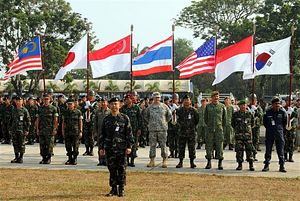On Sunday, media outlets reported that Japan’s Self-Defense Forces (JSDF) personnel had conducted their first drill outside of Japan, in Thailand during the multinational Cobra Gold exercises (See: “US, Thailand to Launch 2017 Cobra Gold Military Exercises”). The move was just the latest sign of the easing legal restrictions on Japan’s defense forces as well as their effects on Tokyo’s contributions to regional and international security.
Under security legislation introduced by the government of Japanese Prime Minister Shinzo Abe, which took effect last March, the JSDF now has an increased ability to protect Japan and Japanese nationals as well as engage in greater international cooperation both in peacetime as well as during certain wartime contingencies. The changes were expected to bolster Japan’s right to collective self-defense as well as its ability to support the armed forces of other countries in operations that contribute to the country’s security and promote international peace.
In a concrete example of how these legislative changes would affect Japan’s ability to defend itself and to work more with its allies and partners, the JSDF held a drill over the weekend in Thailand where the multinational Cobra Gold exercises – Asia’s largest drills – are currently occurring. The drill, based on a scenario of a deteriorating security environment outside of Japan following a disaster, saw JSDF personnel simulate the ground transportation of Japanese and U.S. nationals for airlifting to Japan by an Air-Self Defense Force transport aircraft. JSDF personnel also faced a decision on the use of force as is permitted under law as they encountered a group of people blocking their path to the airport.
Apart from what this says generally about what Japan can do, the context within which Tokyo carried out its first overseas drill is also significant. The Japanese forces involved were part of over a hundred personnel participating in the Cobra Gold exercises, an annual exercise which began as a bilateral drill between the United States and Thailand but has now grown into one of the world’s largest multinational exercises (See: “Exclusive: Managing the Strained US-Thailand Alliance”). Japan has been participating in Cobra Gold since 2005, providing a logical opportunity to carry out overseas drills. Nonetheless, it also highlights the fact that while Japan’s “proactive contribution to peace” is often seen by outside observers through the lens of the U.S.-Japan alliance or its international peacekeeping operations, it also affects what Tokyo does regionally as well.
Therefore, as we track developments in Japan’s growing security role, it will be worth paying attention to what Japan does with other Asian partners, both independently as well as with the United States. As I have indicated elsewhere, since Abe’s return to office in December 2012, Japan has been boosting its security ties with Southeast Asian states as well as increasingly with ASEAN as a bloc, a pattern which has only grown more pronounced on the back of some of these eased legislative restrictions (See: “Japan Reveals First ASEAN Defense Initiative with Vientiane Vision”).

































